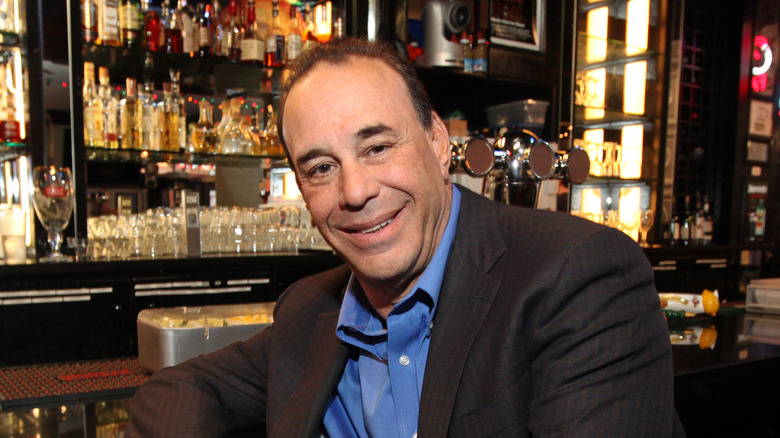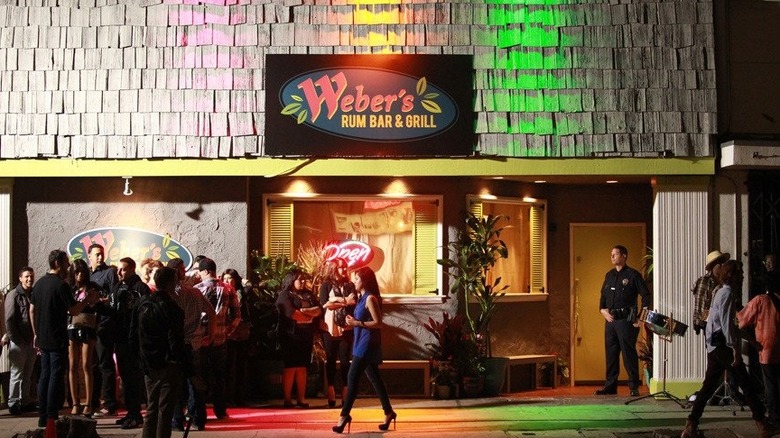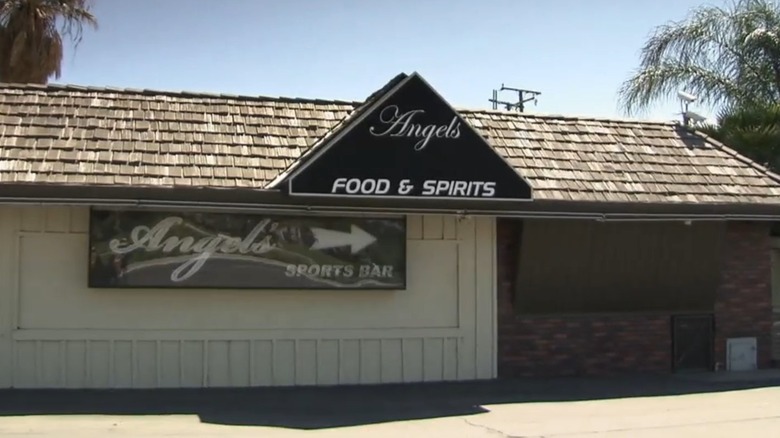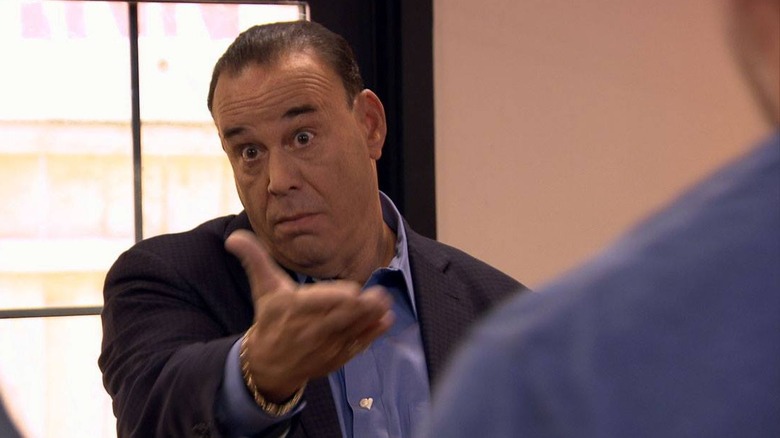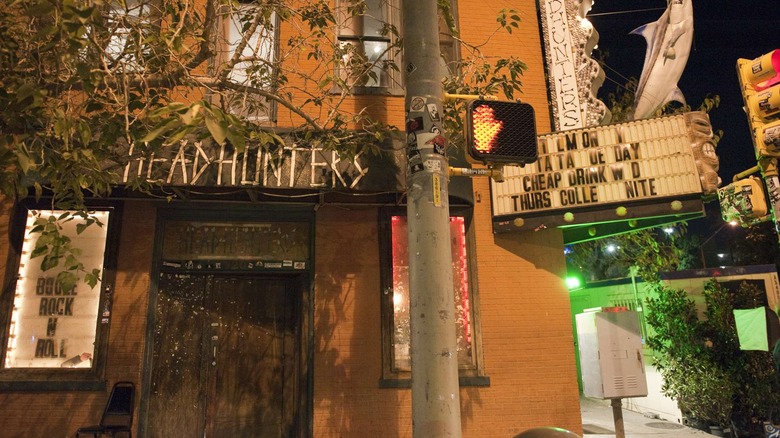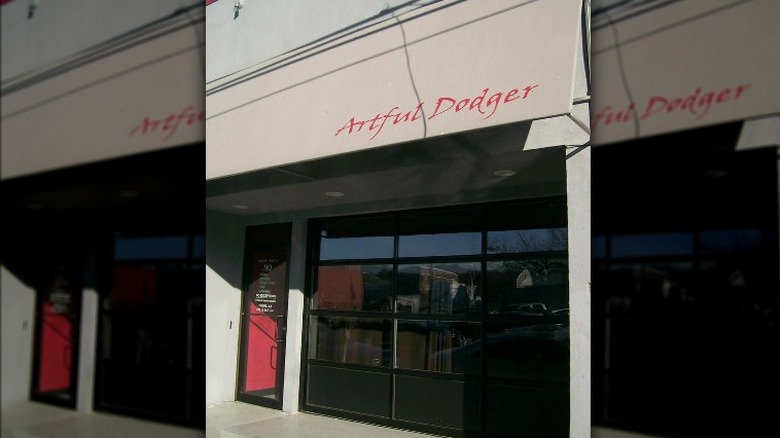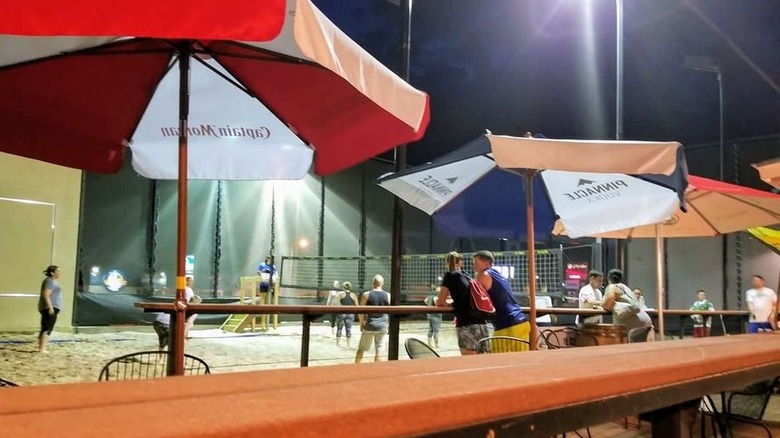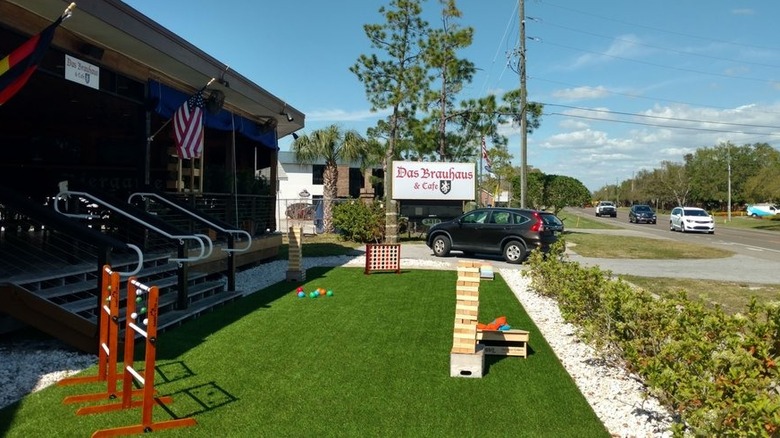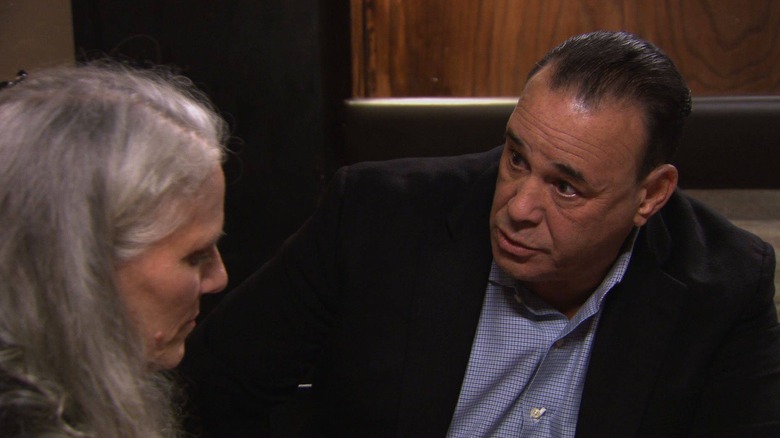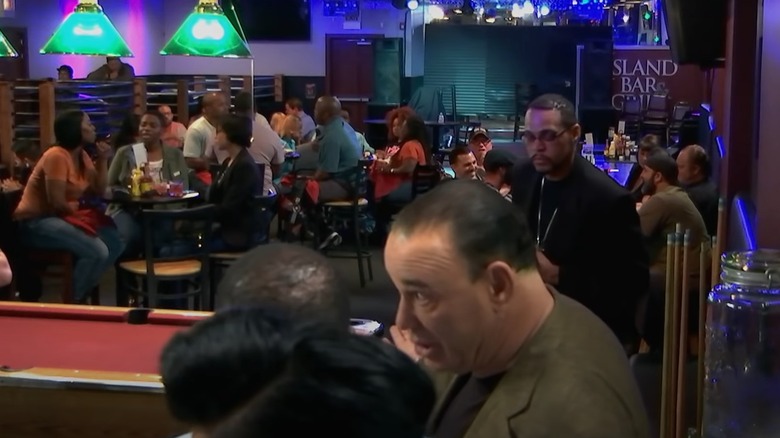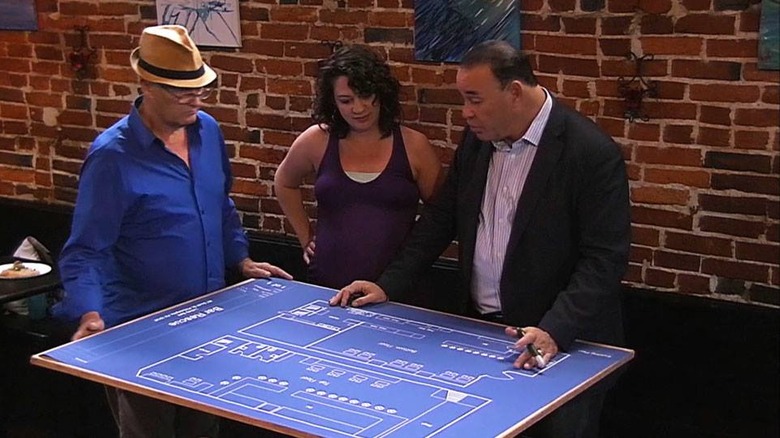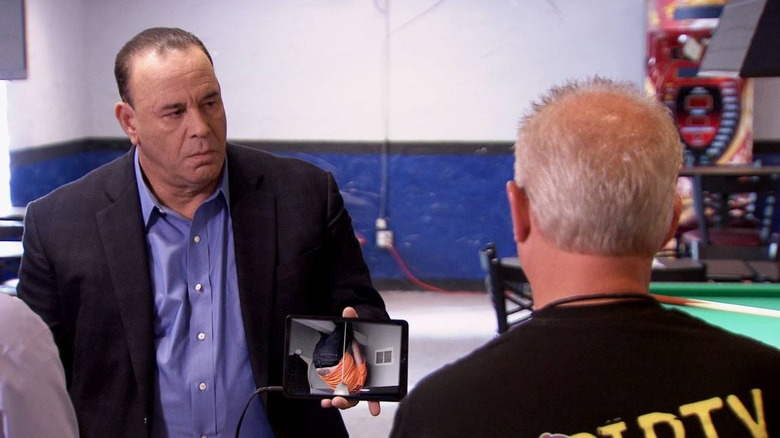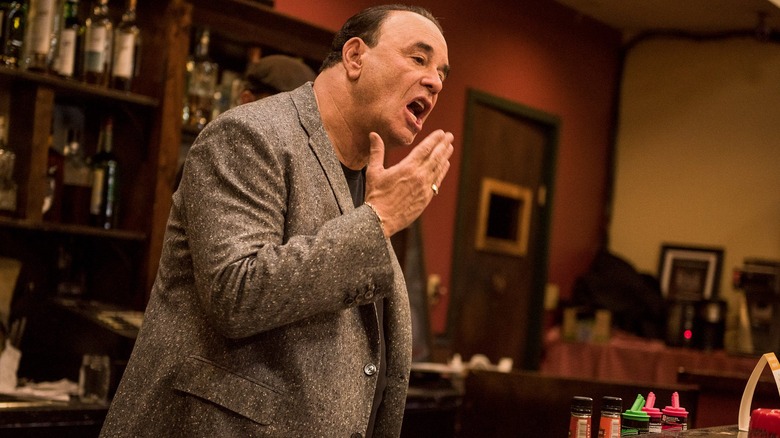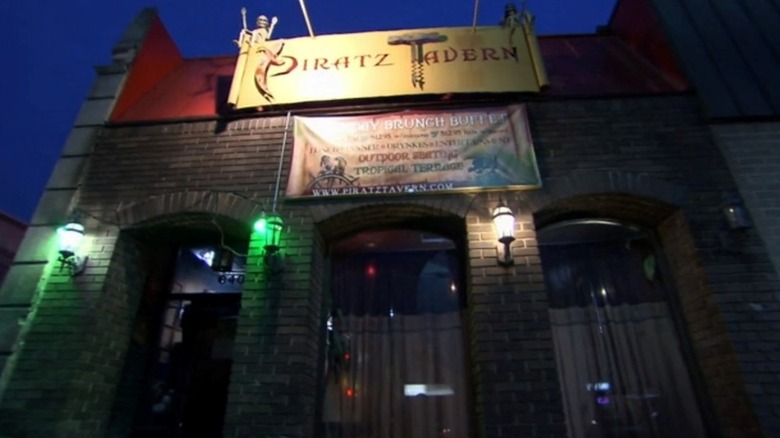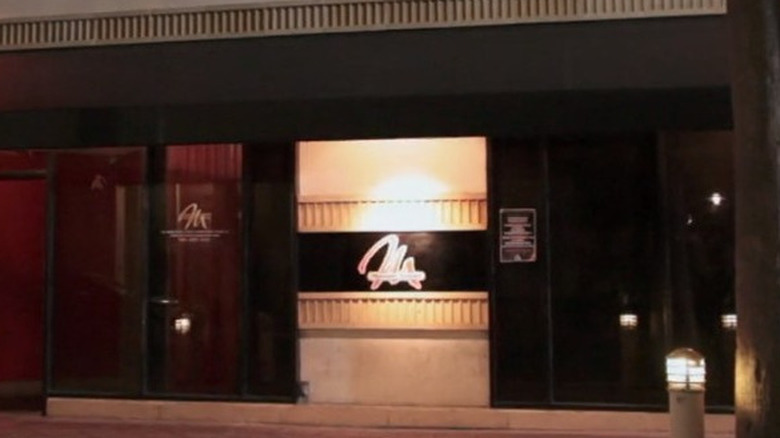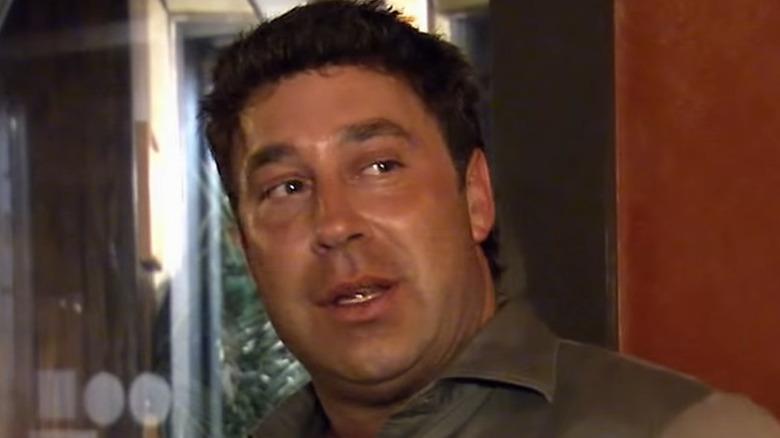15 Bars That Jon Taffer Couldn't Rescue
We may receive a commission on purchases made from links.
Jon Taffer saves bars that are on the verge of shutting down on his reality show "Bar Rescue." So far, he has rescued over 200 bars across the United States. While over 100 of them have remained afloat, 99 have shut their doors. It takes a massive amount of work to rescue a bar — from redesigning the menus, the interior and the logo to picking furnishings and more importantly, changing the attitude of those who run it.
The bars get a second chance and a new lease on life. With some, the changes stick and sales soar. But with some others, the doors close anyway. Taffer follows the progress of every rescued bar through an app on his phone. When some shut down despite his efforts, it doesn't bother him, he tells BroBible. He says, "You're talking to a guy who buys and sells restaurants and bars with no connection to them. They don't live and breathe. They don't have blood. It's a business. It has bricks and mortar around it."
Here's a list of some of the bars that couldn't make it even after Taffer's help.
Weber's Place
Weber's Place in Reseda, California, was a strip club before entrepreneur Kervin Clinton bought it in 2007 and turned it into a place that focused on live music. He wasn't making enough money and on top of that seemed to lose more because of theft by his own employees. Clinton was thousands of dollars in debt when he called for Jon Taffer's help.
Taffer first took down any décor that still remained from when the bar was a strip club, like giant red lips that opened up to the kitchen. He also set up a closed-circuit television system so that Clinton could keep an eye on his staff at any given time through his phone. He wanted the bar to lose its identity as a live music place, for the best live music spots such as Troubadour were just a few blocks away on Sunset Boulevard. Instead, Taffer brought in a Caribbean theme as an ode to Clinton's roots and renamed the place Weber's Rum Bar and Grill (via Gazette Review).
Everything seemed to have ended well for Clinton. But the bar was not able to maintain the standards set by Taffer. According to Bar Rescue Updates, patrons complained of poor service and not being able to get most things listed on the menu. A year after the episode was aired in 2012, the bar closed in 2013.
Angel's Sports Bar
Angel's Sports Bar in Corona, California, was losing $4,000 a month before Jon Taffer and his crew came to save it in 2011. The bar was located next to a strip club of the same name. The building was unwelcoming, the interior dirty. The food quality was bad — the pizza was served on a frozen pizza tray. Furthermore, the credit card machine didn't work, and it cost $6 more for a customer to withdraw from the ATM at the bar. Since it catered to a large biking community, the sight of motorcycles parked outside the bar was common. According to research, as Taffer pointed out in the "Bar Rescue" episode, if there were three or more motorcycles outside the bar, 65% of the women above 34 wouldn't enter.
Taffer rebranded the bar as a whiskey bar and changed the name to Racks Billiards and Bourbon. He renovated the interior to include a lounge area and billiard tables and set up a credit card terminal. To avoid the sight of bikes in the front of the bar, he put up a "no parking" board (via Gazette Review).
The bar's rating on Yelp was average, and the bar had remained afloat until August 2015, when a stabbing incident took place outside its premises. It dampened the traffic, and the bar ultimately shut down. In 2019, a fire destroyed the building — strangely, it wasn't an accident, said the Corona Fire Department.
Gipsy
Founded in 1977, Gipsy was one of the earliest gay nightclubs in Las Vegas. Despite its history, the club was $2 million in debt when Jon Taffer came to rescue it in 2013. Taffer found that the place was stuck in the past, with long drag shows that were outdated and slowed down the business at the bar. But more importantly, the owner Paul San Filipo had poor management skills and a disrespectful attitude towards his employees.
Taffer realized that the place needed a whole new concept if it was to connect with the contemporary crowd of Las Vegas. He redesigned the interior to give it a Florida South Beach feel of the 50s. He took down the old Gipsy name board and renamed the place SBLV Ultra Lounge. The 45-minute long drag show was replaced with shorter performances that included other dance forms, choreographed by Dominique Kelly who has worked with stars such as Taylor Swift and Miley Cyrus. The new concept made sure that customers didn't stay away from the bar for long, thereby ensuring higher sales.
Everyone, except the owner Filipo, seemed to love it. Filipo disliked it so much that he never showed up for the re-launch, and three days later, he shut it down, promising it would all be redone and opened soon. In 2020, the building was bulldozed to the ground, according to KNPR.
Headhunters
With cockroaches in bottles, women dancing in skimpy clothes, and cringeworthy performances on stage, Jon Taffer called Headhunters, located in Austin, Texas, the worst bar he had seen in his 35-year long career as a bar consultant. Adding to the mountain of issues was the owner Steve Ricci's attitude, as he refused to take responsibility for the lack of hygiene at the place.
An ex-engineer, Ricci had put in all his life's savings to start Headhunters as a "fetish-themed tiki bar and music venue." While it did well in its initial days, as more live music bars cropped out around the Red River District in Austin, Headhunters failed to get any good bands. From being a hunter, it was now the hunted — being preyed on by the competition around.
As part of the rescue in 2012, Taffer had professionals fumigate the place and clean up the mold. He got the employees on payroll after discovering (shockingly so) that they only took the evening's tips home. The concept of the bar was changed to steampunk and the name to Metal and Lace.
While Ricci loved the new look, as seen in the episode, Gazette Review reports that the changes stayed on only a while. The bar went to being filthy, with roaches and all. And worse, the staff was never paid. In 2014, two years after the rescue, Ricci had to shut down the bar (via Austin Chronicle).
Artful Dodger/Radio
Before Jon Taffer came to its rescue, this Huntington, New York, bar went by two names — Artful Dodger and Radio. As far as the story goes, according to Long-Islander News, when the owner Mike Conforti found sales plummeting, he hired a nightclub promoter Brian Gordon who rebranded the place, changing its name to Radio. He also introduced 18-and-over nights targeting a younger clientele. However, they never tipped, never spent a lot of money, and posed a potential risk of the bar getting sued for serving liquor to underage persons. That apart, the bar had serious mosquito and fruit fly problems, with many customers finding the tiny bugs floating in their drink.
As part of the rescue by Jon Taffer in 2014, the bar was cleaned and sanitized, the bartenders were trained by an expert mixologist, and the 18-and-over nights were canceled. Taffer turned the rather dark and dingy building into a mysterious speakeasy called P's and Q's Autobody. After the rescue, the sales went up by 30%. However, a fire accident in the laundromat next to it damaged most of the building in 2015. They did rise form the ashes in 2016, only to shut their doors permanently in 2018. According to Newsday, it was bought by a bartender who worked there. He got rid of the speakeasy concept and named it Repeal XVIII.
The Sandbar Brewery and Grill
At this bar, funnily, there was a confusion as to who really owned the bar. Sean Colwell founded The Sandbar Brewery and Grill — a beach-themed bar that had its own volleyball court located in Albuquerque, New Mexico — in August 2017. For this, he had borrowed $60,000 from Mike Martinez and his team of investors, but he never paid it back. Though Colwell was adamant that he owned a percentage of the bar, when confronted he had no proof to show Jon Taffer that he did.
It became apparent to Taffer that the bar was losing money mainly because of Colwell's poor management skills. He was fired, and the rest of the staff was trained by mixologist Amy Koffsky and chef Jason Santos. The space was renamed Playa Island Bar and redone in a way that every piece of décor shouted beach. The cocktail menu included a shareable, large-format frozen drink and Jell-O shots, targeting groups of people that came in together to play volleyball at the adjacent court.
Six weeks after the bar was rescued by Taffer in August 2019, it seemed to do well, seeing a consistent increase in sales. However, according to Bar Rescue Updates, the bar reverted to its old name after taking a poll on social media. While it remains unclear exactly why, the bar shut down the same year in November.
New England's Ale House
New England's Ale House was almost a million dollars in debt before Jon Taffer and his team rescued it in 2019. The owner Tara Cook was quite desperate to get it back on track, otherwise, she could lose the bar, her home, and her truck, she told Taffer in the episode. Despite being in a locality with a good market, in Palm Harbor, Florida, the bar wasn't making any money.
The issue was poor management. The staff complained that the manager verbally assaulted them. Taffer took care of that by having Cook give the manager an ultimatum.
Taffer devised a new concept for the place, keeping beer as the highlight. He renamed it Das Brauhaus and had the interior redone to look like a German beer house. Award-winning mixologist Mia Mastriani and chef Michael Ferraro were brought in to train the staff. A beer cocktail and a beer-cheese burger were included in the menu.
The bar got positive reviews on Yelp after the rescue, and the sales were up by 39 percent. However, Cook decided to close the bar on Mother's Day that same year as she found it hard to manage the place while going through a divorce and being a single mom with two kids (via Bar Rescue Updates).
Underground Wonder Bar
Lonie Walker launched Underground Wonder Bar in 1989 in Chicago as a place for live music, where she herself performed four nights a week. While it ran successfully for the first 21 years, in 2011 they were forced to move out to another location after the building they were in was sold. In the new and affluent location of the North River district, the rent was astronomically higher. Walker found herself unable to manage the rent and was over $500,000 in debt.
Set in her ways, Walker still performed at the bar without realizing that her music was outdated and not doing much good for the business. When Jon Taffer did spill the truth, Walker did not take it well and even resisted any change that Taffer suggested. Taffer's biggest challenge was to convince Walker that the music didn't work, the décor was unsophisticated, and the menu (that included frozen pizza) was subpar.
Walker did finally come on board, before Taffer renovated the interiors and changed the name to Clear Bar.
The changes stayed only for a while. The Clear Bar name was dropped, and Walker got back to performing at the bar soon after the rescue (via DNA Info). She was still not able to pay her monthly rent of $18,000 a month and had to close in 2017 — three years after the rescue.
Island Bar and Grill
Adam Shorter quit his career in finance to get into bar business in the hope that he would make more money to help out his family, including his sister's medical bills. He sold his house and used all his retirement money as an initial investment and employed his family members at his newly opened Island Bar and Grill in Blue Island, Illinois. While it seemed like a sweet family affair, the only issue, and a rather important one, was that none of them had any prior experience in the restaurant industry.
Though Shorter knew that some of his staff was costing his bar a lot of money, he couldn't get himself to fire them until Jon Taffer and his team intervened in 2016. Shorter kept his sentiments aside and let a few go. It was an important step if he wanted to make money and clear a $400,000 debt. The place was redesigned to give a chic downtown vibe, and the name was changed to Island Lounge.
Six weeks after the relaunch, the bar saw a 10% increase in sales. However, two years later, there was a shooting incident outside the bar that involved one of the bouncers. Because of this, their license was revoked and they were forced to shut down, reports CBS Chicago.
Lickety Split
Lickety Split in Philadelphia was $110,000 in debt and at the risk of closing down in a few months, when Jon Taffer and his team were approached to save it. Taffer found owner Tom Gaylord, a former detective, drunk and disrespectful to his staff. The bar, though located in a prime location filled with a heavy tourist crowd, had subpar food and beverages. Their beers were stored at a much higher temperature than they should be. The refrigerator was filled with old pizza dough, raw chicken, and sausage that had started smelling.
Taffer redid the interiors, turning the two-story space into two different concepts. The lower level was called Alleged Pizza and Bar and featured a pizza station right by the window. The upper level was called 2nd State Lounge and had an entirely different-looking menu. He also introduced Gaylord to a doctor who specialized in post traumatic stress, to help him with his drinking problem.
While the episode had a happily-ever-after ending, the bar didn't. Most of the décor at Alleged Pizza was taken down soon after the rescue. The upper level was converted into a space for live entertainment (via The Philadelphia Inquirer). The year after Taffer's rescue, in 2015, the place closed down. Now in its place stands a restaurant/bar named Milkboy, Gazette Review reports.
Dirty Rooster
Dirty Rooster in Antioch, Illinois, saw boating enthusiasts in summer and snow mobile enthusiasts in winter, thanks to access to Lake Marie. But despite the fact that the place was abuzz almost all year round, it was losing up to $4,000 a month. Jon Taffer came to the bar's rescue after a call from the bar's co-owner Rob Hoffman. Hoffman co-owned the bar along with two others. While he was deeply attached to the bar (even lived right above it), Hoffman had a drinking problem.
When drunk, he gave away free drinks to customers costing the bar a lot of money. Taffer connected Hoffman to a counselor and gave him a second chance to prove he could manage the bar. The concept of the bar was changed to reflect a lakeside hangout spot. Renamed Lake Marie Lodge, the dull grey walls inside were changed to look like they were made of wood. A boat-shaped promotional platform was set up right at the entrance to pull the crowd in. A little over a month after Taffer's rescue, the bar's food and beverage sales were up by 70%.
However, eventually, Hoffman went back to his old ways, reports the Gazette Review. The bar got rid of the special cocktails that the staff was trained to make, as well as received several negative Google reviews about service, furniture, and beverage quality. The bar is permanently closed. A bait and tackle shop now stands in its place.
Havana Cabana
Once a Mexican restaurant, Rocky Point Cantina in Tempe, Arizona, was turned into a Cuban-themed bar and restaurant called Havana Cabana. Jon Taffer was asked to rescue the place after the owners Fran and Mary Massimiano found themselves $1.5 million in debt and losing $10,000 per month.
The place, prior to Taffer's intervention, was a concert space for heavy death metal bands and only opened when there was a booking for a show. A lot of the seating space and an entire bar area was unused. Taffer brought in three new bartenders, two extra cooks, and a new manager to get the place back on track. While the renovated space added a lot of color and brought in a larger crowd, bringing the Massimiano family $6000 a month, it also led to their downfall.
According to Phoenix New Times, the bar never got the permits for the name change. When the management sought to apply for a live entertainment permit at Havana Cabana, it was discovered that the place hadn't a permit to start with. All the performances that were scheduled at the venue had to be canceled, and the place finally closed its doors two months after the rescue.
Piratz Tavern
If you submit an application to appear on "Bar Rescue," we can't imagine any reason you wouldn't be receptive to Jon Taffer's suggestions. After all, if you aren't open to making major changes, the solution is simple: Don't request the show's assistance. Of course, if you do end up on the series, but choose to fight back against Taffer and his team, as was the case with Piratz Tavern owner Tracy Rebelo at her Silver Spring, Maryland, establishment? Well, you're likely to end up just like the pirate-themed bar, which permanently closed in April 2015.
Rebelo was $900,000 in debt and living in her parents' basement when appearing in the Season 2 premiere in 2012 titled "Yo-Ho-Ho and a Bottle of Dumb." Yet she was deeply attached to her establishment's pirate aesthetic and adamantly opposed to changing the concept. In fact, after openly griping (to customers and staff alike) about her displeasure with the bar's new look upon relaunching as Corporate Bar & Grill, she chose to immediately revert back to her preferred Piratz Tavern — in name and design.
Piratz Tavern didn't just reject Taffer's expertise — it also chose to gleefully (and childishly) destroy the Corporate Bar & Grill sign after the fact. "We burned the (new) sign in effigy," Rebelo proudly told Florida Today in 2016, though it's tough to pinpoint why she remained so satisfied when reflecting on Piratz Tavern's ultimate demise.
Mystique Lounge
At first glance, the solutions to the problems found at Mystique Lounge in West Palm Beach, Florida — which Jon Taffer and the series visited in "Mystique or Murder?" (Season 2, Episode 4) — may have seemed fairly straightforward. In fact, you can see how fixing the nightclub's lackluster VIP bottle service and generally undisciplined (and often unsanitary) atmosphere through proper training could have turned its fortunes around. Of course, that approach ignored Mystique's larger issue — namely, the fact that a murder had occurred at the establishment three years prior to Taffer's visit.
Now, you don't need us to explain how a homicide happening right outside an establishment can hurt that business. Naturally, then, the Mystique Lounge's gradual downfall before Taffer and "Bar Rescue" arrived (along with its inability to shake its dangerous reputation after a deadly shooting) is eminently understandable.
Owners Torres Anwar and Darren Cummings were thrilled when their club relaunched as Aura, enthusiastically telling the show's host their bar "had definitely been rescued." Yet the fickle nature of the food service industry means even a great concept may fail in the long run. And, unfortunately, the formerly named Mystique Lounge was destined to become just another statistic, as it closed within a few years of its "Bar Rescue" experience.
South Park Bar & Grill
After more than a decade of episodes, viewers are well-acquainted with the formula employed by "Bar Rescue" and Jon Taffer. But when the series filmed its (presumed) pilot episode back in 2010 at South Park Bar & Grill in Montclair, New Jersey, the exact parameters of what the show was (and would become) weren't yet known. Perhaps that explains why this episode didn't air for several years. It appeared only as a between-season special in 2014 – and provides a sliver of insight as to why the bar itself permanently closed in 2012.
Of course, South Park Bar & Grill (which quickly ditched The V Bar moniker bestowed by "Bar Rescue" for a more-familiar Park Sports Bar name) may have always been on a failing path given owner Jeff Melnikoff's basement-level reputation among some patrons. Frankly, it's not unreasonable to assume the bar was doomed no matter what Taffer did — at least as long as Melnikoff remained in charge.
Now, it may not be entirely fair to place the blame for a restaurant closing solely upon its owner. But seeing how the restaurant had its liquor license suspended in October 2012 for overserving a customer and having police respond to excessive noise complaints and a fight outside the bar and never reopened? Well, maybe it's best to think of horses (rather than zebras) when it comes to why South Park Bar & Grill closed.
